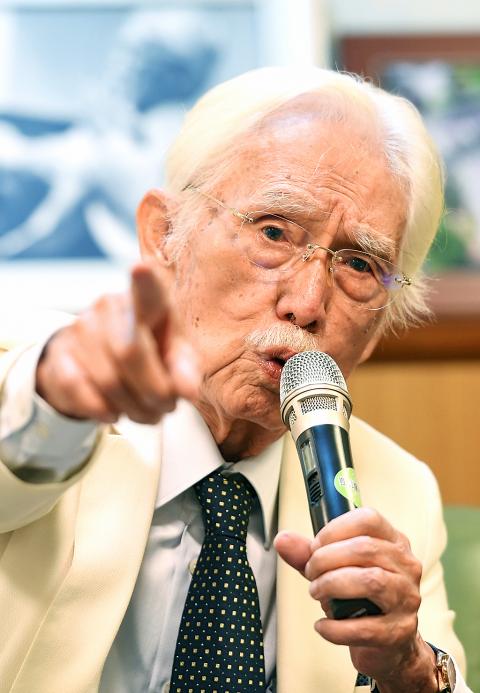Presidential adviser Koo Kwang-ming (辜寬敏) yesterday urged the government to normalize the nation by seeking international recognition as “Taiwan” instead of as the Republic of China (ROC), after Panama switched diplomatic recognition from Taipei to Beijing on Tuesday.
Following the diplomatic debacle, the long-time independence advocate said that Panama’s decision did not come as a surprise as the number of Taiwan’s diplomatic allies has continuously dropped since the ROC was expelled from the UN.
The diplomatic switch is part of a “trend that cannot be reversed” and Taiwan should be prepared for a further decrease in the number of its allies, he said.

Photo: Liu Hsin-de, Taipei Times
However, the decrease in the ROC’s diplomatic allies could increase the space for Taiwan as “an independent state” unassociated with the ROC, he said.
Koo urged the government to abandon the ROC framework and draft a new constitution — to be approved by a referendum — and seek formal UN membership and international recognition with a new state identity.
“Only 20 countries — whose populations are smaller than Taiwan’s — in the world recognize the ROC. What is the meaning of their recognition of the ROC?” Koo said.
Praising President Tsai Ing-wen (蔡英文) for adopting a tougher tone with China when she announced Panama’s diplomatic switch, Koo said it was “the first time she took a hard line” on Beijing’s attempt to suppress Taipei in the international arena, which was a “major change of attitude” in Tsai’s dealings with China.
However, Tsai should not direct her attention only on Beijing, but also toward the Taiwanese public and make Taiwan’s “normalization” her top priority, he said.
Koo opposes Tsai’s China policy of maintaining the “status quo” in cross-strait relations, and has called for increased efforts to make Taiwan a “normal” and independent nation.
“There should be no more talks about maintaining the ‘status quo.’ Action should be taken to deal with our basic problems,” such as renaming the ROC “Taiwan” or drafting a new constitution, Koo said.
Prior to World War II, the only independent countries in east Asia were China, Japan and Thailand, but “70 years later, what Asian country still does not have a proper identity? Only Taiwan,” he said.
About one month ago, he suggested to Tsai that she should reorient cross-strait relations as “brother nations,” but Tsai only said priority should be given to “Taiwan’s admission to the UN,” Koo said.
Beijing is also re-evaluating its Taiwan policy because it has realized its hardline policy has created antagonism in Taiwan, Koo said.

DAREDEVIL: Honnold said it had always been a dream of his to climb Taipei 101, while a Netflix producer said the skyscraper was ‘a real icon of this country’ US climber Alex Honnold yesterday took on Taiwan’s tallest building, becoming the first person to scale Taipei 101 without a rope, harness or safety net. Hundreds of spectators gathered at the base of the 101-story skyscraper to watch Honnold, 40, embark on his daredevil feat, which was also broadcast live on Netflix. Dressed in a red T-shirt and yellow custom-made climbing shoes, Honnold swiftly moved up the southeast face of the glass and steel building. At one point, he stepped onto a platform midway up to wave down at fans and onlookers who were taking photos. People watching from inside

A Vietnamese migrant worker yesterday won NT$12 million (US$379,627) on a Lunar New Year scratch card in Kaohsiung as part of Taiwan Lottery Co’s (台灣彩券) “NT$12 Million Grand Fortune” (1200萬大吉利) game. The man was the first top-prize winner of the new game launched on Jan. 6 to mark the Lunar New Year. Three Vietnamese migrant workers visited a Taiwan Lottery shop on Xinyue Street in Kaohsiung’s Gangshan District (崗山), a store representative said. The player bought multiple tickets and, after winning nothing, held the final lottery ticket in one hand and rubbed the store’s statue of the Maitreya Buddha’s belly with the other,

‘NATO-PLUS’: ‘Our strategic partners in the Indo-Pacific are facing increasing aggression by the Chinese Communist Party,’ US Representative Rob Wittman said The US House of Representatives on Monday released its version of the Consolidated Appropriations Act, which includes US$1.15 billion to support security cooperation with Taiwan. The omnibus act, covering US$1.2 trillion of spending, allocates US$1 billion for the Taiwan Security Cooperation Initiative, as well as US$150 million for the replacement of defense articles and reimbursement of defense services provided to Taiwan. The fund allocations were based on the US National Defense Authorization Act for fiscal 2026 that was passed by the US Congress last month and authorized up to US$1 billion to the US Defense Security Cooperation Agency in support of the

‘COMMITTED TO DETERRENCE’: Washington would stand by its allies, but it can only help as much as countries help themselves, Raymond Greene said The US is committed to deterrence in the first island chain, but it should not bear the burden alone, as “freedom is not free,” American Institute in Taiwan Director Raymond Greene said in a speech at the Institute for National Defense and Security Research’s “Strengthening Resilience: Defense as the Engine of Development” seminar in Taipei yesterday. In the speech, titled “Investing Together and a Secure and Prosperous Future,” Greene highlighted the contributions of US President Donald Trump’s administration to Taiwan’s defense efforts, including the establishment of supply chains for drones and autonomous systems, offers of security assistance and the expansion of